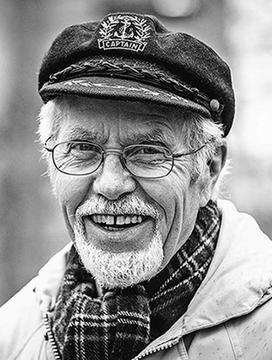In Memoriam: Pierre A. Piroué
Image 
PIERRE A. PIROUÉ, professor emeritus of physics, died Feb. 12 in Princeton. He was 88. Piroué arrived at the University in 1956 as a graduate student and joined the faculty in 1961 after earning his doctorate from the University of Geneva. He later became the Henry DeWolf Smyth Professor of Physics and transferred to emeritus status in 2001. He taught two of the largest courses in the department, General Physics I and II. An expert in particle physics, his research helped lead to key breakthroughs, including the discovery of the Higgs boson in 2012.











4 Responses
Anthony Zee ’66
5 Years AgoTwisted Chalk
I regret to hear of the passing of Professor Pierre Piroué (In Memoriam, March 18). I took an extremely challenging undergraduate physics course from him. While the name and the specific content of the course escape me, I have a vivid memory of Pierre twisting a piece of chalk and breaking it cleanly into two pieces. In a pleasant French accent (which still sometimes reverberates in my brain), he told us that he would make us learn how to calculate the beautiful spiral cross section of the break. I think that the course was a singular outlier in the standard undergraduate physics curriculum, even at Princeton in that bygone era. During the intervening decades, I have had absolutely no reason to calculate that particular cross section and have totally forgotten how to do it. Perhaps something to do with the stress and strain tensor?
The standard undergraduate physics curriculum in American universities has meanwhile been dumbed down, again, and yet again, to the point that such a course would now be unthinkable, possibly even leading to a lawsuit about cruelty to undergraduates. But I must have learned a great deal from Pierre, even though I am unable to retrieve it for the life of me.
Later, as a junior faculty member in the Princeton physics department, I had the good fortune of knowing Pierre better, and not as a demanding taskmaster.
Brooks Washburn ’75
5 Years AgoUseful Useless Knowledge
I had to laugh out loud with a tear in my eye (thank you for that in these difficult times) when I read Anthony Zee ’66’s tribute to his professor and colleague Pierre Piroué (Inbox, May 13). He said that after solving the professor’s problem inspired by a broken piece of chalk, “during the intervening decades I have had absolutely no reason to calculate that particular cross section and have totally forgotten how to do it.”
Oh, all of the stuff that we learned that is in that category: useless ... except it wasn’t. I practice but also teach as an adjunct at a local engineering university, and I tell my students that much of what I learned decades ago is outdated and irrelevant — but you know what? We learned how to learn, and that is a life-long, never-ending, always-changing, extremely important process and product.
I’m thankful for that. Thank you, Princeton, and thank you, Anthony, for the heart-healthy laugh.
Greg R. Smith ’75
5 Years AgoFrom Music Class to Data Entry
To echo my classmate Brooks Washburn’s comments about the category of “useless” learning in undergraduate education (Inbox, June/July issue): I now find myself in semi-retirement working part-time at the New Jersey State Archives in Trenton doing data entry from 19th century birth ledgers. I wondered why the strings of “random” numbers and jumbled letters were transcribing so easily and why I was so enjoying this mindless labor. Flash back to music composition class with Professor Paul Lansky *73 (check out his delightfully Mozartian new creations on YouTube!), where I spent a good deal of time copying and transposing 12-tone strings of pitches for weekly assignments. Who knew! After 40-plus years! Just like riding a bicycle, you never forget what you learn at Princeton!
William T. Scott ’77
5 Years AgoFreshman Physics
I am grateful to Anthony Zee ’66 for sharing his memory of Professor Piroué. I focus on Dr. Zee’s statement that the “standard undergraduate physics curriculum in American universities has been dumbed down, again, and yet again … .” Detached from academia since earning my AB in math, I wonder whether the claim applies for alma mater, and if yes, why so when Princeton is accepting a slimmer fraction of top applicants than ever before. Perhaps PAW will investigate. At least until the matter is resolved, I can imagine that no freshman since my time has had it tougher than I did in Professor Alan Guth’s section of Physics 104.